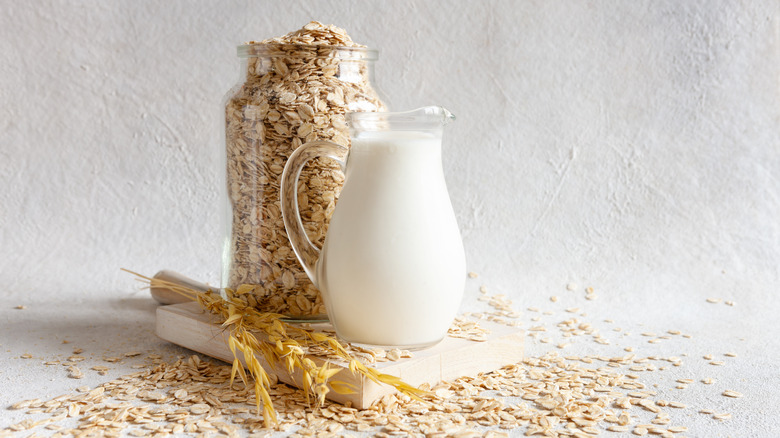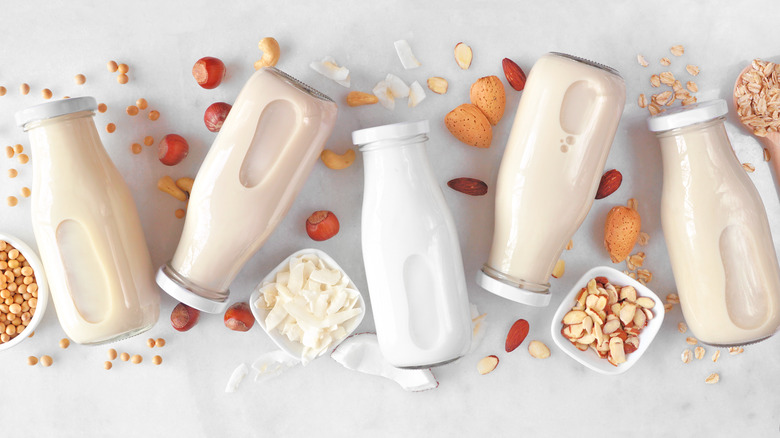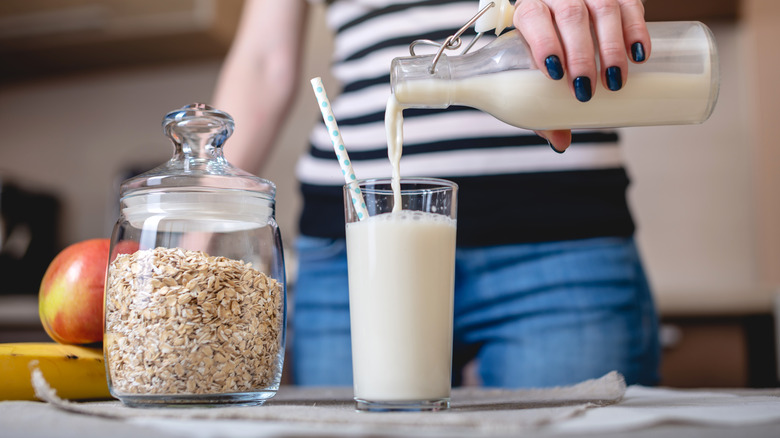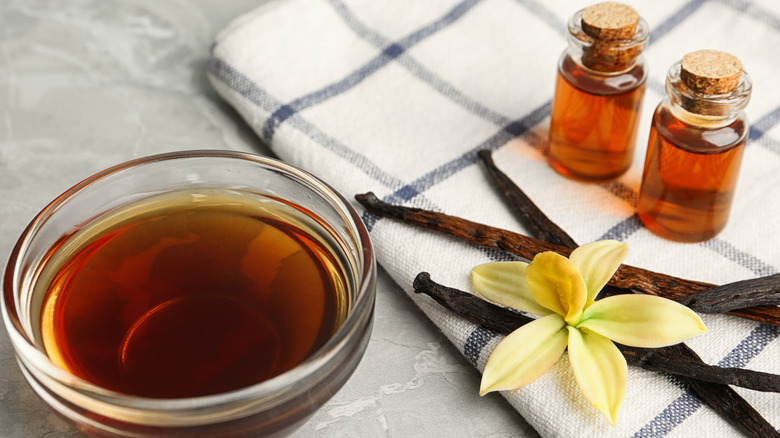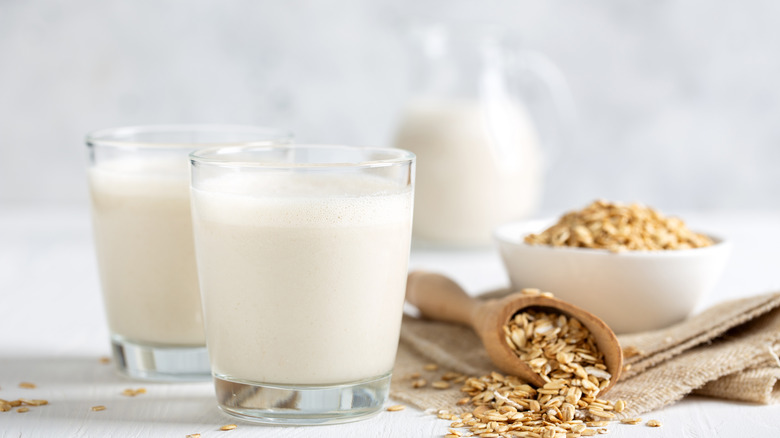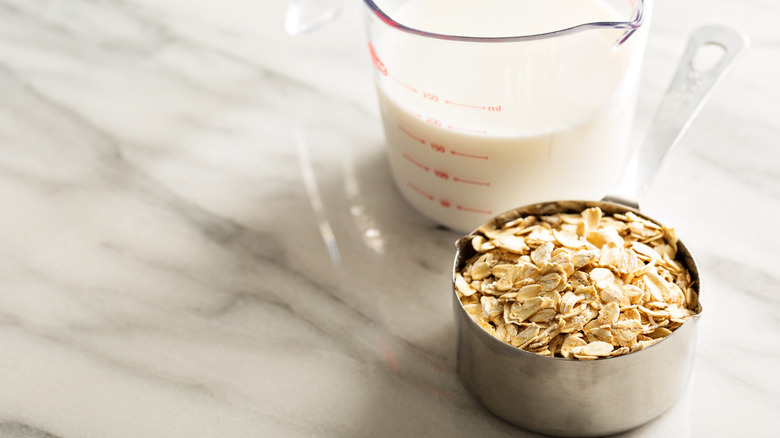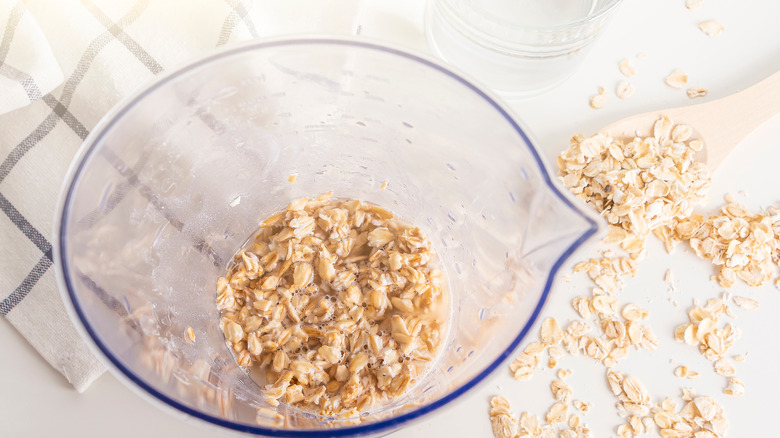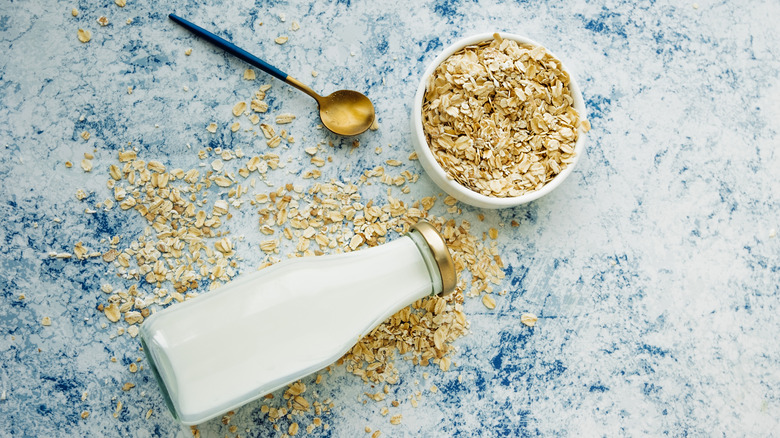All The Pros And Cons Of Making Your Own Oat Milk
We may receive a commission on purchases made from links.
To oat milk, or not to oat milk, that is the question. With the rise in popularity of this dairy alternative, many people are considering making their own at home, even though it is readily available in most local grocery stores. So, is it worth the effort?
Exploring the pros and cons may help you decide if making your own oat milk is a good idea. While it can be a fun and customizable experience, it requires time, equipment, and may even have a different texture than what you're accustomed to tasting. The decision to make your own oat milk comes down to personal preferences and priorities.
At this point, you might be asking: What even is oat milk? Well, this versatile dairy alternative can be found in all sorts of recipes, and is a great addition to something like oat milk honey lattes or cereal. It has become increasingly popular in recent years, due to its many health benefits and comparable consistency to ordinary milk. It's especially great for those who are lactose intolerant, allergic to nuts, or following a vegan or plant-based diet.
If you're looking for a dairy-free, plant-based alternative milk, it might just be the answer. The ingredient list of oats and water may be simple, but making it at home is deceptively complicated. So, how far are you willing to go for your oat milk?
Pro: Controlling what goes in
Tired of crying over spilled milk? Maybe it's time to take matters into your own hands; it's a great way to show those dairy cows who's boss.
Picture the containers of oat milk that line the grocery store shelves. While you can read the label on the front, the one on the back is often overlooked. Many store-bought, plant-based milk varieties contain gums or thickeners (such as carrageenan) to improve texture and shelf life. These ingredients can cause digestive issues for some people, or contain other harmful additives. If you're looking to regain control over what you consume, making your own oat milk is a step in the right direction.
When you make your own oat milk, you control the ingredients and avoid potential allergens or sensitivities. Since you preside over what goes in, you choose the ingredients. Pick the type of oats, the sweetener, and the flavorings you desire and adjust them to your palette and dietary needs. If you so choose, it can be a vegan, gluten-free, and nut-free way of making milk.
Con: A mess to clean up
Creating oat milk in your kitchen may not offer the same level of convenience as purchasing it from a store, and it takes up. lot of your time, both in preparation and clean up.
Regardless of how cautious you may be, producing oat milk at home can be a disordered experience from start to finish. Homemade oat milk also requires both equipment and effort, as is the case of any DIY project.
First, you'll need to soak the oats and water for a few hours or overnight, which can result in a sticky, gloopy mess. Then, when it's finally time to blend the oats with water and strain out the milk, you'll likely end up with oats splattered all over your countertop, appliances, and maybe even yourself.
Whether you are new to the oat milk making process or a seasoned pro, straining the oats can be one of the messiest steps. As you strain the milk through a cheesecloth or bag, be prepared for some spills and drips — and be sure to clean the cheesecloth, because it's reusable. For those brave home cooks who are really unlucky, the bag or cloth could tear, causing even more mess and frustration.
Pro: It's a cost effective milk alternative
The best oat milk brands can be expensive. Depending on how much you and your family consume, you may be spending more than you'd like on the white stuff. So, perhaps you could save some coin by filling up that cereal bowl with oat milk made at home.
The price of store-bought oat milk can vary depending on the brand, location, and store. Generally speaking, a standard-sized container of rolled oats can cost anywhere from $2 to $5, while a carton of oat milk can cost anywhere from $3 to $7. Keep in mind that prices can be higher or lower in different regions, and that some specialty brands may carry a premium price tag, but in essence what you're paying extra for is water.
Making your own oat milk at home is cost-effective in the long run, because the required ingredients are inexpensive and readily available. Rolled oats, water, and a sweetener (such as maple syrup or dates) is what you really need, and if you're willing to use tap water, there's a third of your ingredients right there (kinda) for free.
Oats are a low-cost ingredient that you can easily find at any grocery store. Many of us have various sweeteners sitting around the pantry already. Furthermore, making your own oat milk at home eliminates the costs of packaging, transportation, and marketing — all included in the price of store-bought varieties and passed along to the consumer.
Con: Maintaining all the tools
A significant part of successfully creating homemade oat milk is having the right equipment for the job. While the recipe for oat milk is relatively simple, from blenders to strainers, having the right tools on hand can make all the difference when it comes to achieving a smooth and creamy texture.
To make oat milk at home, it's best to have a high-speed blender (this will help break down the oats into a smooth, creamy consistency); a standard blender or even a food processor could be used in a pinch, but the oat milk may not be as smooth. To remove any bits of oats from the milk, you will also need a fine mesh strainer or cheesecloth. A nut milk bag, or a piece of cheesecloth is ideal. You will also need a pitcher or container in which to store the finished oat milk. A pitcher with a pour spout will make it easier to pour the milk into a glass when it's ready; you might also find it helpful to have a whisk or spoon handy to stir the oat milk as needed.
While making your own oat milk at home can be cost-effective in the long run, the equipment can be an investment. You'll have to consider your budget — as well as whether you have a place to store everything when it's not in use.
Pro: You can customize the flavor
Another benefit of making your own oat milk is the ability to customize flavor, fine-tuning the taste to your liking. Taken naturally, oat milk has a slightly sweet and nutty flavor, with a creamy, smooth texture similar to cow's milk or soy milk. Some prefer flavorings or sweeteners to enhance the taste, and if you're buying the store-bought stuff, you're beholden to the varieties they have available. At home, you can experiment.
Homemade oat milk allows you to control sweetness level, as opposed to store-bought oat milk, which contain added sugars or flavors which may not align with your preferences or dietary restrictions. In your kitchen, you can add natural sweeteners like maple syrup, honey, or dates to your milk. You can also add flavors like vanilla, mint, or almond extract as per Food and Wine.
Such experimentation can enhance the flavor of your milk and make it more enjoyable to drink without altering the consistency or texture. So, tailor it to your taste buds (for chocolate lovers, try a few spoonfuls of cocoa powder!), put on a labcoat and channel your inner mad scientist.
Con: It has a limited shelf life
Store bought oat milk can last for several weeks in the refrigerator; homemade stuff will spoil faster. Just like dairy milk, the fruits of your labor will be perishable and consumed within a certain time frame.
Oat milk should typically be consumed within 5 days of opening it. This is because your homemade variety won't have preservatives, and oat milk in general has a high water content. Water is a breeding ground for bacteria — even small amounts of contamination can cause the batch to turn quickly.
A downside of making your own plant-based milk is that the contents will easily spoil if not stored properly. Therefore, it's crucial to store your homemade oat milk in an airtight container, refrigerate and consume it within a few days. That lack of preservatives that gives processed foods a longer shelf life will make your homemade oat milk more susceptible to bacterial growth and spoilage.
If you're not a fan of guzzling down a jar of oat milk in one sitting, you can always freeze some for later. It is recommended to freeze for up to three months. The quality of your oats can also impact the milk's shelf life; oats that are old or have been exposed to moisture can be more likely to spoil.
Pro: It's great for substitutions in baking
Whether it's for dietary needs or personal preference, homemade oat milk can be a great substitute for cow's milk; and if you're a regular baker, even better.
Not only is it a healthier option, but it is also a vegan-friendly alternative that can be employed in a variety of recipes. Unlike some nut-based milks that have an overriding flavor, the taste of oat milk is mild, so it won't overpower your other ingredients. It provides a creamy texture and neutral flavor similar to dairy, making for a go-to versatile option to be dispatched in a range of baked goods, from cakes and muffins to breads and biscuits.
The best part might be that when it comes to substituting oat milk for cow's milk in baking, the ratio of the two liquids is typically the same. In most recipes, you can use oat milk as a one-to-one substitute for cow's milk. Moreover, your homemade oat milk has a similar consistency to cow's milk, which makes it a great substitution. Because of its high water content, oat milk adds moisture to baked goods, introducing added tenderness and moisture. This makes it an excellent choice for cakes, muffins, and other baked goods that can otherwise easily dry out. If you're a baker, it's a no-brainer to keep some homemade oat milk on hand.
Con: Be weary of slimy consistency
Those with aversions to certain food consistencies beware: If made incorrectly, oat milk can get slimy.
While the taste of the homemade plant milk may be spot on, the texture could still be way off. The consistency of oat milk varies depending on the type of oats used, the ratio of oats to water, and the method of preparation. In general, the homemade version should be a creamy, slightly thick liquid. If done incorrectly, the final mixture can end up far less palatable. "This results in a chalky, gritty texture and lots of separation," Shashank Gaur, specialist of plant-based nutrition, told Insider. "The starches in oats can turn slimy when heated, so the texture becomes like a pudding."
This is due in large part to the natural properties of oats, which contain a type of soluble fiber called beta-glucan; when mixed with water, beta-glucan tends to thicken and gel. When making oat milk at home, the oats are blended with water to create a milk-like consistency; blended for too long, or with too much water added, the beta-glucan in the oats becomes overly activated.
On the other hand, if you don't blend the oats for long enough, the milk may be too watery and not achieve your desired creaminess. How long to blend is a key factor in finding the right consistency — and for some, juggling variables such as the type of blender being used, the quantity of oats, and the desired consistency can be overwhelming.
Pro: Minimize your carbon footprint
Sometimes, loving your oat milk means loving the planet, too.
Making your own oat milk at home not only has benefits that are dietary but environmental as well. Oat milk is eco-friendly, contributing to decreased dairy consumption, reduction of your carbon footprint, and conservation of water. These are all considered positive contributions for protecting the planet.
By making oat milk at home, you increase sustainability. Store-bought oat milk often comes in non-recyclable paper or plastic packaging; even if it is housed in recyclable materials, the empty packaging is often not recycled when empty. When you make your own oat milk, you avoid buying packaging that is often added to garbage piles. Store your oat milk in reusable jars and containers, reduce packaging waste, and significantly reduce the amount of plastic waste you generate. It's an easy way to make a difference.
Also consider the transportation and production processes of mass produced milk. Commercial producers often rely on factory farming practices that can have negative environmental impacts, such as deforestation and soil degradation. When you make your own at home, you'll not only enjoy the taste — but also the flavor of knowing you've discouraged such practices, kept a delivery truck or two from making an extra trip, and done your part in contributing towards and supporting sustainable farming practices.
